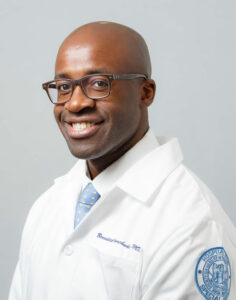Reverse Shoulder Arthroplasty Surgeon

Are you suffering from severe shoulder arthritis? If so, you may be a candidate for a reverse shoulder replacement. Reverse shoulder replacement may be recommended in patients who have developed a complex type of shoulder arthritis called “rotator cuff tear arthropathy.” Reverse shoulder arthroplasty surgeon, Doctor Benedict Nwachukwu provides diagnosis as well as surgical and nonsurgical treatment options for patients in Manhattan, New York City, NY who have severe shoulder arthritis. Contact Dr. Nwachukwu’s team today!
What is a reverse shoulder arthroplasty?
“Normal” or conventional shoulder replacement arthroplasty has been a successful treatment for individuals with advanced osteoarthritis since the 1950’s. However, patients with severe rotator cuff tears were not candidates for this type of shoulder replacement because the damaged shoulder was unable to “hold” the prosthesis in place. Finally, in 1985, French physician, Dr. Paul Grammont, created the reverse shoulder replacement. Reverse shoulder arthroplasty literally reverses the orientation of the ball and socket. Instead of the ball, being on the top of the humerus (arm bone) it is fitted into the shoulder glenoid (socket). The plastic cup is fixed to the humerus, allowing the shoulder to function normally in a smooth pain-free motion. Dr. Benedict Nwachukwu, orthopedic shoulder surgeon, has extensive experience with reverse shoulder arthroplasty and can help patients in Manhattan, New York City and the surrounding New York boroughs achieve excellent outcomes from this specialized procedure.
Why would a reverse total shoulder arthroplasty be needed?
Traditional shoulder arthroplasty is a very successful treatment for patients with shoulder arthritis and other conditions. With a traditional shoulder replacement, the rotator cuff tendon helps position the arm and gives it power and strength when raising or moving the arm. However, patients who have a large rotator cuff tear, or if the shoulder anatomy is altered by prior injuries, shoulder fractures or a prior surgery, a traditional shoulder replacement will not function properly. Persistent shoulder pain, limited range of motion and early joint instability can be the by-products of a failed traditional arthroplasty. A condition known as “cuff tear arthropathy” may develop in patients with chronic or large rotator cuff tears, causing ongoing destruction of the shoulder joint.
What is cuff tear arthropathy?
Cuff tear arthropathy is a shoulder condition in which the rotator cuff tendon no longer works properly and the shoulder develops a very specific type of shoulder arthritis. Cuff tear arthropathy typically has three things in common:
- Arthritis of the glenohumeral joint (ball and socket joint in the shoulder)
- Superior migration – where the ball shifts away from its normal anatomical position in the socket
- Large rotator cuff tear that cannot be repaired.
Who should have a reverse total shoulder replacement?
Reverse total shoulder replacement may be recommended for the following:
- Cuff tear arthropathy
- An irreparable, complete tear of the rotator cuff
- Failed anatomical shoulder replacement
- Chronic shoulder dislocations
- Severe shoulder pain and difficulty lifting the arm to the side and overhead
- Complex shoulder joint fractures
- Failed previous non-surgical treatments that did not alleviate pain: ice, rest, medication, cortisone injections and physical therapy
How long is the recovery following reverse shoulder arthroplasty?
Dr. Nwachukwu commonly performs reverse shoulder arthroplasty and prefers to keep his patients overnight in the hospital following surgery. He will prescribe antibiotics to prevent infection and pain medication to be taken as indicated. He will provide a specialized post-surgery protocol, including the use of a sling and specific shoulder exercises to help regain function of the shoulder. Patients in the New York area can expect significant improvement and function in the shoulder in about 3 to 4 months. Many patients report the rehabilitation process to be easier with a reverse shoulder arthroplasty than with rotator cuff surgery or with traditional shoulder arthroplasty.
For more information on reverse shoulder replacement or reverse shoulder arthroplasty or to see if you are a candidate for this specialized surgical procedure, please contact the office of Benedict Nwachukwu, MD, orthopedic shoulder surgeon serving Manhattan, New York City and surrounding New York boroughs.





